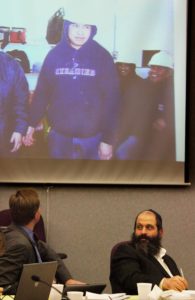This can’t be what Iowa lawmakers had in mind when they agreed last year to make some criminal records private.
The legislature created a new section of the Iowa Code, 901C, to keep certain criminal records private if the defendant was acquitted or found not guilty. There are, of course, caveats. All court costs and fines must be paid in full. The case must be at least 180 days old, and the not guilty verdict cannot be due to a finding of insanity or incompetency.
But, if the criteria is met, beginning on Jan. 1, interested case parties could petition to have a criminal case hidden from public records.
The law change was necessary, advocates said, because the Internet makes court information more readily available. Every day, they argued, Iowans were hampered and punished by dismissed criminal charges. Found not guilty of the crimes they’d been charged with, these Iowans nonetheless had difficulty accessing housing or getting jobs.
With public support, lawmakers generally and rightfully labeled such implications unfair, a contradiction to the American principle of innocent until proven guilty.
Such arguments placed images in our collective mind’s eye of a person haunted by unfounded charges, unable to move forward and blocked from being a productive member of society. Sholom Rubashkin doesn’t fit that mold, but he is one of the first to benefit. Although serving time in federal prison, Rubashkin has succeeded in hiding the public record of an Iowa child labor case brought against him.

Rubashkin, as many readers remember, is a member of the ultraorthodox Jewish family that previously owned and operated the Agriprocessors meatpacking plant in Postville. Once the largest kosher meat producer in the U.S., Agriprocessors came under government scrutiny for food safety, environmental issues, child labor, animal treatment and an illegal workforce. Aaron Rubashkin, Sholom’s father, owned the meatpacking plant, and Sholom served as CEO, overseeing day-to-day operations in Postville.
It was after a massive 2008 immigration raid at the meatpacking plant that a string of state and federal investigations resulted in multitude of criminal charges, several naming members of the Rubashkin family.
Sholom Rubashkin was arrested in October 2008 on federal conspiracy charges related to workforce and identity theft. He was released on $1 million bond, only to be arrested again the next month on federal fraud charges. According to court documents, he illegally diverted millions to inflate the value of the business, and ordered plant workers to cover his tracks. He was convicted a year later on 86 counts of financial fraud and money laundering.
Federal prosecutors dropped the immigration case following the fraud convictions to “avoid an extended and expensive trail, conserve limited resources and lessen the inconvenience to witnesses.”
Rubashkin, 57, was sentenced in June 2010 to 27 years — 324 months in prison, and five years of supervised release. Although lawyers continue to battle on his behalf, his case was upheld by an appeals court and refused by the U.S. Supreme Court.
In addition to federal charges, Rubashkin also faced state charges on child labor law violations. The trial began May 2010 in Waterloo, with Rubashkin facing an indictment on 83 counts (down from the original charge of more than 9,000).
In June 2010, days before Rubashkin’s federal sentencing, he was found not guilty of the charges. But to be clear, no one argued that minors weren’t present in the plant. Rubashkin’s defense was that he didn’t know, and, since the federal immigration case had already been dismissed, evidence from that case — which included identification documents found in the plant — was not admitted.

An agreement was later reached between the state and new plant owners. A guilty plea to all 83 counts of child labor law violations was entered by the business and its human resources manager, but Rubashkin was not personally held accountable.
Which brings us back to this year. Beginning Jan. 1, the court began accepting petitions to have cases expunged from the public record. A petition from Des Moines attorney Stephen Locher to expunge the Rubashkin child labor case quietly took effect on Jan. 29.
Anyone now searching the official record for information on that case will come up empty. In fact, unless you know the case number, something no longer publicly available, the Black Hawk County Court Clerk’s office can’t confirm that the case once existed and has been hidden from view.
A court search on Rubashkin’s name brings up a host of cases, a few personal and many more related to his dealings at Agriprocessors, but not the child labor case. Google and other Internet search engines continue to make the sordid details freely accessible to anyone interested enough to search, even if the legal context is lost.
Does hiding the public record in such high-profile cases cast a shadow on legitimate reporting done at the time?
Rubashkin isn’t just another guy, trying to make his way in the world after being wrongly accused. He isn’t being denied housing, refused employment or otherwise hindered by past charges. Three taxpayer-funded hots and a cot are included in his extended stay at the People’s Hilton — things provided to those decimated by the plant’s deceptions and subsequent bankruptcy by charity, when they were provided at all.
Legally, Rubashkin worked within the confines of the newly crafted law to obscure this piece of his past. But I fail to see how the now private record follows the spirit of what advocates and lawmakers intended.
This column by Lynda Waddington originally published in The Gazette on February 27, 2016. Photo credit: Jonathan D. Woods/The Gazette & Andrea Melendez/Pool
